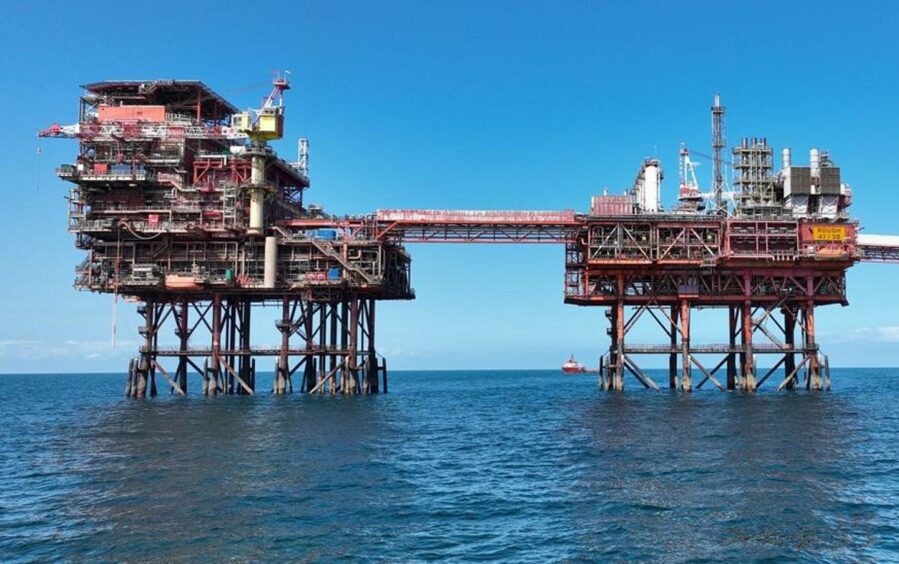 © Supplied by Centrica
© Supplied by Centrica Two years after the Scottish Government launched a draft strategy with a “presumption against” developing new North Sea oil and gas, a business group has accused Holyrood of “burying its head in the sand” as the UK faces winter gas shortages.
Aberdeen and Grampian Chamber of Commerce (AGCC) has called on First Minister John Swinney to reverse the policy, which it claims aims to “hasten the end of North Sea production” in a move that is “disconnected from reality”.
The Scottish Government published a “draft” energy strategy and just transition plan in January 2023, which stated “there should be a presumption against new exploration for oil and gas”.
While intended to accelerate the shift to renewables, the stance has drawn widespread criticism from industry leaders, workers, and business organisations.
AGCC chief executive Russell Borthwick said: “The presumption against oil and gas is disconnected from reality, as we saw last week when Centrica warned that our gas storage levels were at a dangerously low level.
“Even the most optimistic projections show that hydrocarbons will remain part of the energy mix for decades. The International Energy Agency acknowledges this reality, so why is the Scottish Government burying its head in the sand?
“Oil and gas currently supports around 200,000 jobs across the UK, almost half of them in Scotland. These aren’t just numbers – they are livelihoods, communities, and families.
“Accelerating the decline of North Sea oil and gas will destroy this world-class supply chain, and for what? To make a symbolic point while we continue importing oil and gas from nations with far less stringent environmental standards and a much higher global carbon toll?
“We should be leveraging the expertise of our oil and gas workforce to lead the global energy transition. The same engineers who make the North Sea one of the safest and cleanest production basins in the world can pioneer carbon capture, hydrogen production, and offshore wind. But we can’t get there by demonising the very industry that these workers and companies rely on for work.”
Under Labour, the UK Government has followed the Scottish Government and said it will halt new oil and gas exploration licenses in the North Sea.
A sea of challenges
Following the UK government’s commitment to extending the hated Energy Profits Levy “windfall tax”, oil and gas firms including the likes of Equinor (OLS:EQNR), Ithaca (LON:ITH) and Shell (LON:Shel) are facing the further uncertainty of legal challenges in UK courts.
Equinor and Shell are currently awaiting the result of a hearing held in Edinburgh over downstream, or scope three, emissions. Before Christmas the two firms revealed a shock announcement to merge their North Sea assets, creating the UK’s largest oil and gas operator in the face of uncertain legal rules.
AGCC pointed to some eyebrow-raising backing for beleaguered North Sea firms from the likes of president-elect Donald Trump, who described the UK’s opposition to oil and gas exploration as a “very big mistake”.
Borthwick added: “Donald Trump’s support for the North Sea is welcome, but it should not fall to the president-elect of America to make the case for jobs and investment here.
“We need full-throated support for our oil and gas sector from both our governments, but particularly here in Scotland where it is such a crucial part of our economy.
“The presumption against oil and gas must go and be replaced with a policy position which will deliver energy security and transition in tandem.
“If the alternative is importing oil and gas at a greater carbon cost, then we must favour domestic production.”
Acting Cabinet Secretary for Net Zero and Energy Gillian Martin said the Scottish Government was grappling with a “rapidly changing landscape” for energy policy and that it was “taking time to reflect … before drawing any final conclusions” on its energy strategy.
She said: “We are clear that any further extraction and use of fossil fuels must be consistent with Scotland’s climate obligations and just transition commitments.
“It is vital that we take an evidence-based approach to the energy transition, which ensures that we support and retain the skills and investment needed for the transition to net zero.
“Decisions on North Sea oil and gas licensing are reserved to the UK Government. We have consistently said that these should be made on a case-by-case basis and include rigorous assessments of both climate compatibility and energy security.
“The judgements and issues in the draft energy strategy and just transition plan are being informed and influenced by recent developments in the UK Government’s energy policy and court decisions.
“This is a rapidly changing landscape and we are taking time to reflect on those developments before drawing any final conclusions.”


